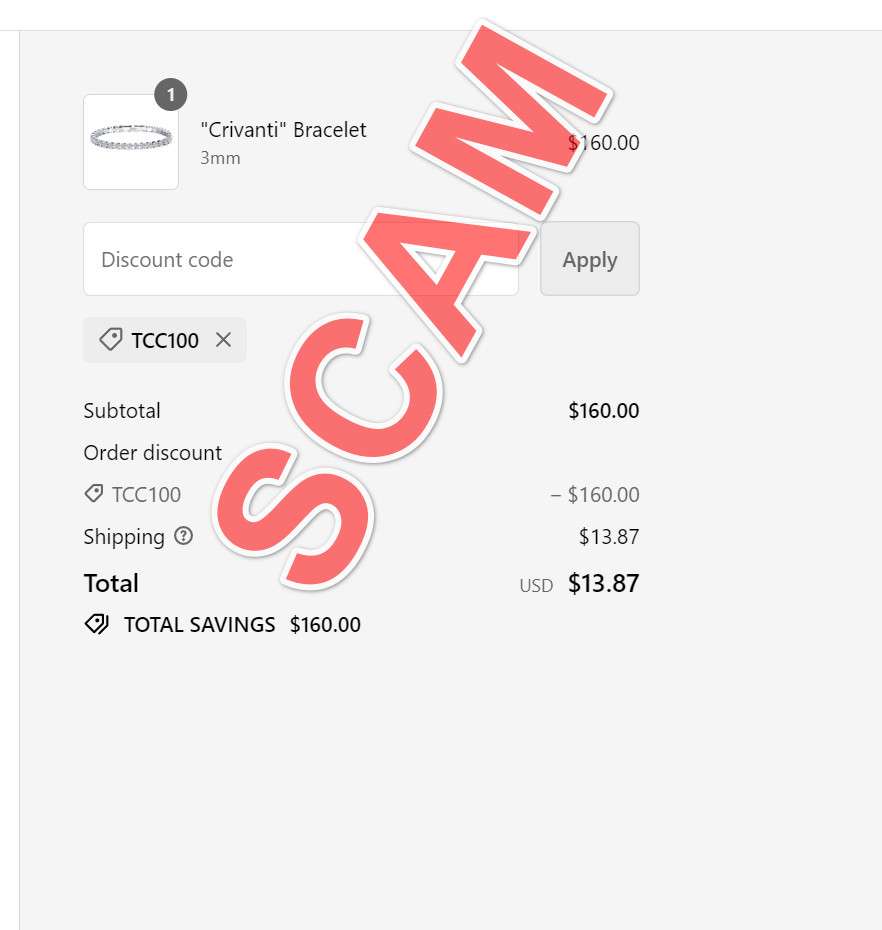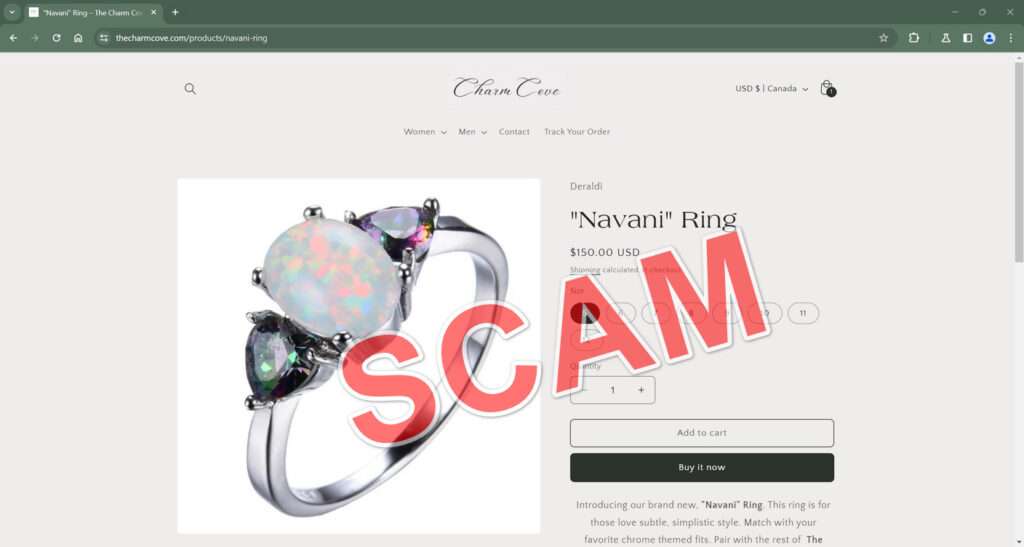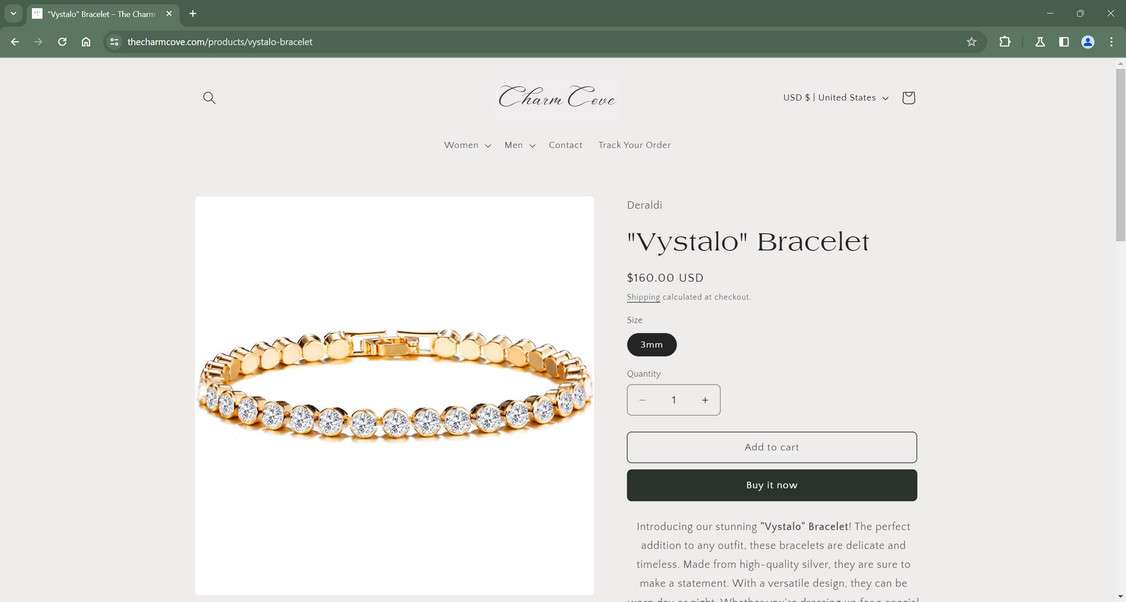A deceitful online scam has emerged on social media, luring in victims with offers of luxury jewelry at impossibly low prices. Scammers create elaborate advertisements promoting Charm Cove as a jewelry retailer with a special 100% off coupon code. However, the company is completely fictional. This con aims solely at stealing money and personal data.


Overview of The Charm Cove Coupon Scam
Sophisticated cyber scammers have crafted an intricate jewelry shopping scam surrounding the website The Charm Cove at thecharmcove.com. This portal prominently promotes alluring 100% off coupon specials that purportedly enable free high-end bracelets, necklaces, rings and earrings with only minor shipping fees.
In reality, this website has no relation to any actual jewelry business. Fraudsters simply abuse eye-catching images of luxury accessories along with convincing advertising copy to collect financial data. After victims input credit card information expecting dramatic savings, their money gets stolen without receiving anything.
The complex architecture powering this scam encompasses ad creation, multimedia production, web design, copywriting and technical infrastructure specifically engineered to deceptively part victims from their money. Robust promotion over Facebook, Instagram and TikTok ensnares traffic, directing unsuspecting shoppers to the fraudulent thecharmcove.com platform built just for data harvesting by a cybercrime group based in China.
How the Scam Works
Here are the steps scammers take to execute this jewelry coupon scam on social media and scam sites:
- Ads Created – The fraudsters design video ads, social posts and pay-per-click ads promoting a fake company called Charm Cove. These claim Charm Cove is offering its luxury jewelry for free using a special promo code.
- Viral Distribution – Scam ads run on TikTok, Facebook, Instagram and more to reach the maximum number of potential targets. These ads’ fraudulent claims spread widely through visibility algorithms.
- Site Development – In tandem, the swindlers build elegant scam websites with Charm Cove branding to send traffic from ads. These sites display images of rings, necklaces and other jewelry seemingly valued from $120-$200.
- 100% Off Code – When a user visits the site, a prominent coupon code field sits on the homepage. Entering the advertised 100% code triggers shop carts to update saying “You Saved $XXXX!” where XXXX matches jewelry items’ original prices.
- Checkout & Personal Info Collection – Users are led through checkout, prompted to create accounts and enter addresses, emails, phone numbers and other personal data – everything fraudsters need to enable financial theft and identity theft.
- Mandatory Shipping Fees – Despite 100% savings claims, checkout presents mandatory shipping fees of generally $10. These small charges serve as bait to collect payment details before the scam concludes.
- Disappearance – After payments process, orders vanish without any follow-up. No actual jewelry products are ever shipped. Soon after, the fraudulent sites themselves go offline once the scam network abandons them for fresh domains to continue their masquerade with new victims.
Outcomes for Victims
There are two primary outcomes consumers face if they fall prey to the fictitious Charm Cove jewelry coupon offers:
- Stolen Money – The minimal shipping charges process successfully, allowing scammers to unlawfully take funds from victims’ payment accounts. They bank on small amounts slipping past fraud monitoring.
- Compromised Personal Data – No legitimate jewelry products ship. However, users’ names, addresses, phone numbers and other sensitive information entered on scam sites gets stolen for identity theft and resale on dark web crime markets.
So while the $10 loss per person may seem small, the cumulative card theft combined with mass identity data harvested can generate immense illicit profits for these fraud groups. They exploit sheer volume across many victims at once.
Some users eventually recognize real jewelry will not arrive and try disputing the charges. But banks often struggle validating fraud on small amounts, allowing scammers to still profit. And once personal data enters criminal hands, long-lasting identity theft threats persist.
Who Runs The Scam?
Research suggests these “Charm Cove 100 Percent Off” coupon scams likely originate from organized cybercriminal teams in China that manage networks of fraudulent phishing websites, especially targeting US and global victims.
By hiding their identities behind internet anonymity tools, these scam groups can seamlessly shift operations across new company names, domains, and hosting infrastructure to stay ahead of authorities.
They produce scripts for videos and social posts that appear highly authentic to the average social media user. But digging deeper reveals no legitimate foundations underneath – simply illusionist tricks playing on human psychology and the desire for online bargain hunting.
How To Recognize Charm Cove Scam Ads
Here are signs revealing fraudulent Charm Cove jewelry coupon promotions:
- No Company Online – Searching for Charm Cove itself yields no authentic branding, company info, customer service contacts or legitimate jewelry merchandise. A brand with television ads as claimed should have an obvious real presence.
- New Social Accounts – Scam TikTok, Facebook and Instagram accounts promoting the codes have all been recently created in same period as scam websites.
- No Social Conversation – Aside from scam ads, these accounts have zero organic conversation, allowing them to rapidly blast promotions undetected by communities.
- Ad Targeting Only – The accounts exist exclusively to target audiences with scam jewelry offers and drive traffic to fraudulent sites through clickable links, rather than engaging communities.
- Plagiarized Videos – Roosevelt Hughes and other personas claiming Charm Cove affiliation simply use scripted videos stolen from othercoupons cheats with logos digitally added later.
- No Transparency – No company ownership, leadership or locations tied to Charm Cove or its promotional accounts ever emerge beyond fictitious people whose images are AI-generated. Without transparency, such claims clearly lack legitimacy.
If an offer seems too good to be true from accounts and sites showing these characteristics, consumers are wise to avoid entering any sensitive information or attempting purchases. Reporting suspicious promotions can also help curb propagation of the scam.
Steps If You Are Scammed
If you already ordered from a fake Charm Cove website and lost money or data, take these urgent actions:
- Bank Activity Monitoring – Carefully monitor financial account statements for any unusual, fraudulent or suspicious activity. Review transactions daily to detect unauthorized charges from stolen payment data.
- Lock Down Accounts – Initiate password changes and security freezes across banking, credit card and other monetary service accounts immediately before criminals have a chance to exploit compromised information further. Enable two-factor authentication as well everywhere possible for strengthened protection, along with installing anti-virus software.
- Issue Chargebacks – Work with banks and credit card providers to report transaction fraud and request urgent chargebacks on all unauthorized charges related to the scam website orders. Provide site details and notify authorities to contest payments.
- Credit Reports – Run credit reports with Equifax, Experian and TransUnion to identify whether stolen identity details have already led to fraudulent accounts or activity in your name. Consider placing temporary credit freezes if suspicious entries arise, only allowing lifts for legitimate applications.
- FTC/IC3 Reports – Formally report incidents to the FBI Internet Crime Complaint Center (IC3) and Federal Trade Commission (FTC) including all transaction specifics so investigative bodies have scam operation details on file allowing potential future prosecution.
Reporting rapidly, enacting security measures vigilantly and continuing to monitor identity and accounts closely are all vital actions if compromised by coupon scams like these fraudulent Charm Cove promotions. Preventing criminals from fully capitalizing on stolen consumer data greatly minimizes lasting risks and damages from such treacherous schemes.
The Bottom Line
Supposed coupon codes offering 100% off Charm Cove luxury jewelry ultimately prove too good to be true. No real company or verification exists behind the scam claims and prominent advertisements.
The scam stores simply facilitate payment and identity theft, underscored by complete lack of legitimate jewelry merchandise shipping post-orders. Widespread promotion of unbelievable deals on social platforms should be considered an automatic red flag to consumers.
Those worried about compromised security from past scam orders must take urgent precautions monitoring accounts and locking down credit while reporting the incidents to all relevant financial and legal authorities. Continued vigilance in the aftermath can help contain damages inflicted by cunning jewelry coupon scams purpose-built to steal from unwitting shoppers.
This article is for informational purposes only and should not be relied upon for financial or business decisions. We identify potential scams using research, user experiences, and expert analysis. However, all claims should be independently verified. Mistakes may occur, and legitimate products could be flagged. We strive for accuracy but make no warranties regarding the completeness or reliability of the information.
If you are the owner of the website or product in question and wish to offer clarifications regarding your business or website, please reach out to us via our Contact form.



![How to Remove Krouns.co.in Pop-ups [Virus Removal Guide] 11 McAfee scam 4](https://malwaretips.com/blogs/wp-content/uploads/2023/08/McAfee-scam-4-290x290.jpg)